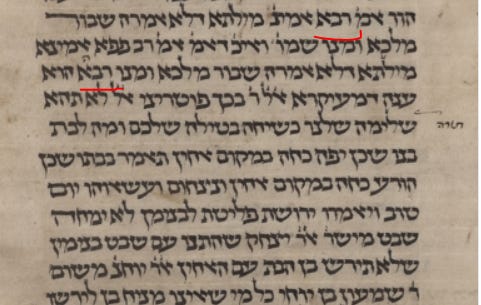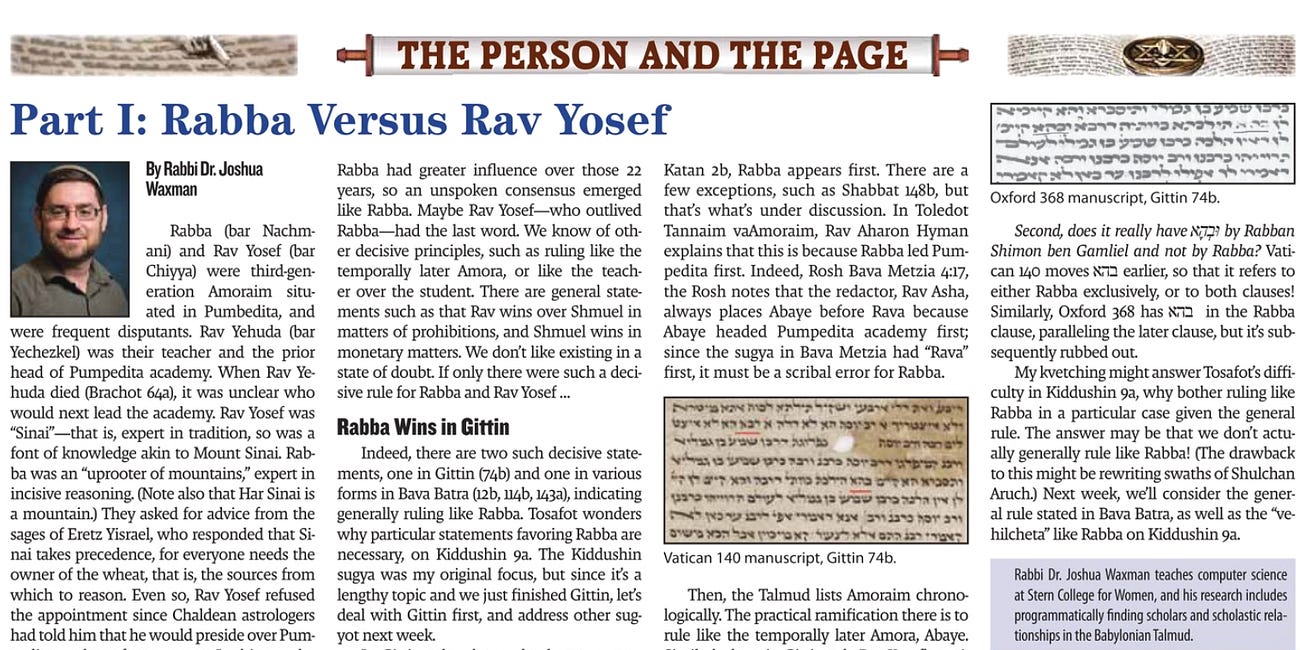Rabba as Shapur?
There was an aspect in yesterday’s post on Rava and King Shapur II that I omitted in my haste.
Rava and King Shapur II
In my old Jewish Link article I posted earlier today, I argued that in s specific gemara, the King Shapur in play was King Shapur II, and it was Rava speaking. That is, in Bava Batra 115, we read:
Specifically, I discussed this manuscript, Vatican 115b, which has an emendation above the line of Rava with an aleph to Rabba with a heh.
Note that there are two instances of Rava in the image. The first is in the first internal variant and the second is in the second internal variant (ikka de’amrei). Why does a scribe selectively edit just the second?
I think he was influenced by Rashbam’s commentary, that Rabba was King Shapur. Rashbam writes (according to our girsa):
אמר רבה אמינא כו' ומנו שמואל - ולפי שהלכה כמותו בדינים קרי ליה הכי והוא שם של מלך פרס:
איכא דאמרי אמר רב פפא כו' - רבה נמי קרי שבור מלכא משום דהלכתא נמי כוותיה לבד משדה ענין ומחצה דהלכתא כרב יוסף (לעיל בבא בתרא דף קיד:):
So he seems to have a girsa before him with Rabba in both cases. But while the former may be debatable in terms of whether Rashbam wrote / saw Rabba or Rava, the second is clearly referring to Rabba bar Nachmani. It is an explanation of how Rabba can be referred to as King Shapur. Namely, what we had said on the immediately preceding daf, Bava Batra 114b. After a debate on the previous page between Rabba and Rav Yosef, with the much later Rav Ashi wading in, the gemara itself (whatever that means) concludes:
וְהִלְכְתָא כְּווֹתֵיהּ דְּרַב יוֹסֵף בְּשָׂדֶה, עִנְיָן וּמֶחֱצָה.
And the halakha is in accordance with the opinion of Rav Yosef in the disputes concerning the division of a field, discussed above (12b), reneging while they are discussing the same matter, discussed here, and a half of one’s property, discussed below (143a).
The implication is that these are the only three cases where Rav Yosef wins, and in the many many other disputes throughout Shas, it is Rabba who wins. Thus, according to Rashbam, he is King Shapur, just as in the earlier variant, Shmuel who almost always prevailed in monetary halachic disputes was King Shapur.
Since that’s manifestly there for Rashbam, it makes sense for a scribe the “fix” the text by making this over-the-line emendation.
By the way, besides not thinking that it is indeed Rabba (see preceding post), I am not persuaded that we always rule like Rabba over Rav Yosef. I think this might be a post-Talmudic statement, as a mnemonic; that IIRC one of these three cases is actually him arguing with Abaye; and that even if true, it is only restricted to the disputes within Bava Batra or maybe more expansively, in the larger tractate of Nezikin.
I wrote my thoughts down in some articles about this. See the following two posts:
Rabba vs. Rav Yosef, part one (article summary)
Here is a summary of my recent article, which looks into the decisive principle (kelal hora’ah) that in a dispute between Rabba and Rav Yosef, we rule like Rabba, except for a short list of cases. It is now available via flipdocs, HTML, paid Substack
Rabba vs. Rav Yosef, part two (article summary)
This post is a summary of part two of Rabba vs. Rav Yosef, and the exploration of whether it really is a legal decisive principle. Because it is part two, and the subject matter is complicated, it really pays to first read part one. So if you haven’t, or if it has been too long since part one, why not first reread it?





